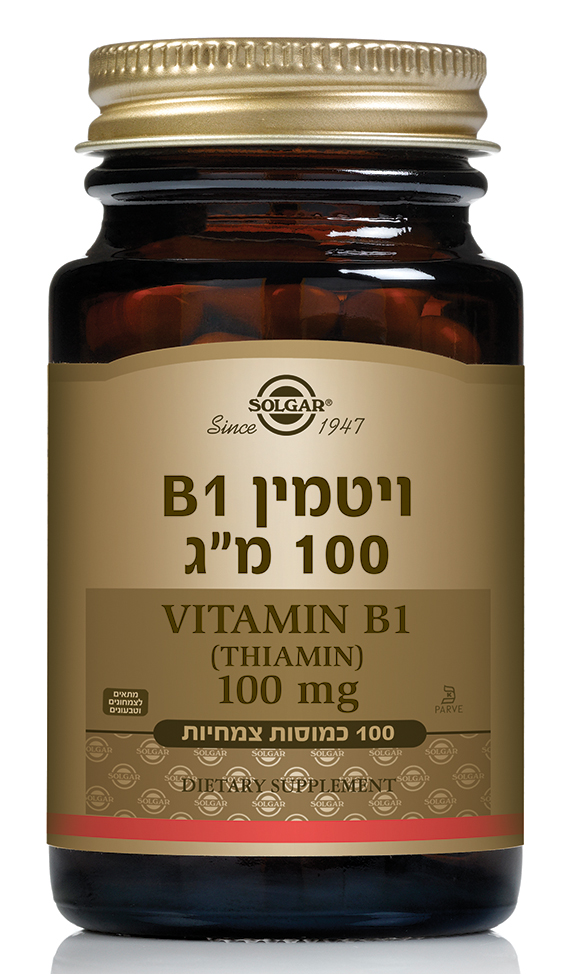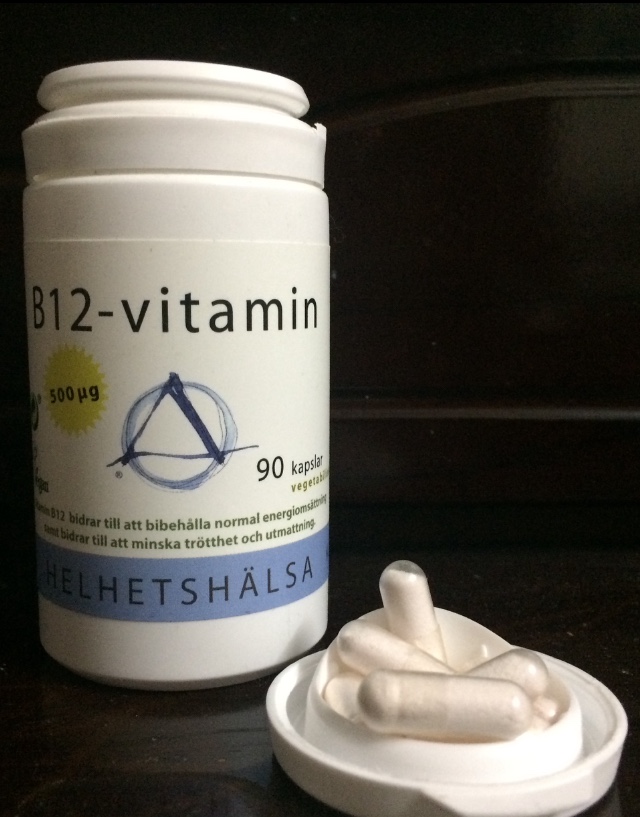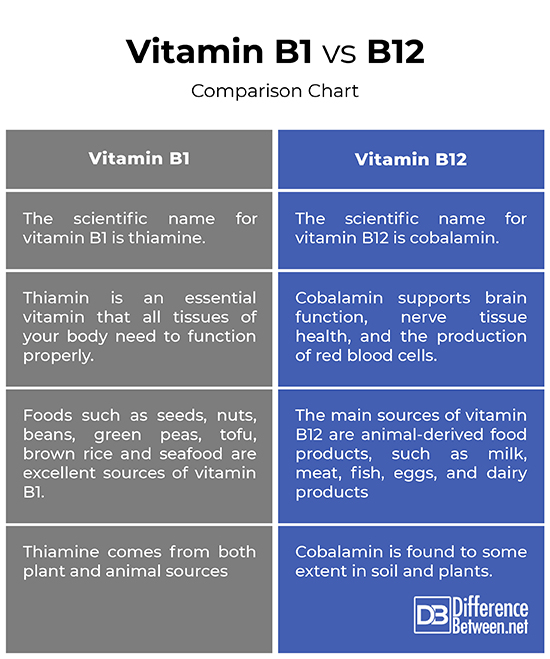Difference Between Vitamin B1 and B12
The vitamins in the B-group are a class of water soluble-vitamins that play an essential role in cell metabolism. Cells are the most important part of the human body, which makes B-group vitamins essential for humans to make sure the cells are functioning properly. The vitamins in the B group include eight chemically distinct compounds: vitamin B1 (thiamine), vitamin B2 (riboflavin), vitamin B3 (niacin), vitamin B5 (pantothenic acid), vitamin B6 (pyridoxine), vitamin B7 (biotin), vitamin B9 (folic acid or folate), and vitamin B12 (cobalamin).

Vitamin B1
Vitamin B1, also known as thiamine, is an important vitamin found in catabolism of sugars and various amino acids as well. Thiamine helps the cells in your body convert food into energy. It is considered as an essential vitamin because it is required but not synthesized by the body, and thus, must be obtained from dietary sources. If you do not have enough vitamin B1 in your diet, you may experience some symptoms of thiamine deficiency such as poor sleep, malaise, loss of appetite, muscle weakness, irritability, and confusion. The food sources of thiamine include peas, whole grains, legumes, meat, fish, eggs, green leafy vegetables, orange and tomato juices, and more. Thiamine comes from both plant and animal sources, and plays a crucial role in certain metabolic reactions in the human body.

Vitamin B12
Vitamin B12, also known as cobalamin, is an essential micronutrient that helps keep your blood and nerve cells healthy. It is involved in almost every kind of cell metabolism included in human body. It affects DNS synthesis and DNA regulation. You need vitamin B12 for brain function, nerve tissue health, and the production of red blood cells. Cobalamin is synthesized by microorganisms and enters the food chain through animals eating such organisms. Thus, the main sources of cobalamin are animal-derived food products, such as milk, meat, fish, eggs, and other dairy products. In addition, fortified breakfast cereals and nutritional yeasts are excellent sources of vitamin B12. It is found to some extent in soil and plants. Therefore, it is believed that vegans do not get a sufficient intake of cobalamin.
Difference between Vitamin B1 and B12
Role
Vitamin B1, also known as thiamine, is an important vitamin found in catabolism of sugars and various amino acids as well. It helps the cells in the human body convert carbohydrates into energy. Carbohydrates provide energy for the body, especially the brain and nervous system. Thiamin is an essential vitamin that all tissues of your body need to function properly.
Vitamin B12, also known as cobalamin, is an essential micronutrient that supports healthy nerve and neurological functioning. It affects DNS synthesis and DNA regulation. You need vitamin B12 for brain function, nerve tissue health, and the production of red blood cells.
Sources
Thiamine comes from both plant and animal sources, and plays a crucial role in certain metabolic reactions in the human body. The food sources of thiamine include peas, whole grains, legumes, meat, fish, pork, beef, eggs, green leafy vegetables, orange and tomato juices, and more. Foods such as seeds, nuts, beans, green peas, tofu, brown rice and seafood are excellent sources of vitamin B1.
The main sources of cobalamin (vitamin B12) are animal-derived food products, such as milk, meat, fish, eggs, and dairy products. In addition, fortified breakfast cereals and nutritional yeasts are excellent sources of vitamin B12. Cobalamin is synthesized by microorganisms and enters the food chain through animals eating such organisms.
Deficiency
If you do not have enough vitamin B1 in your diet, you may experience some symptoms of thiamine deficiency such as poor sleep, malaise, loss of appetite, muscle weakness, irritability, and confusion. It may lead to a common condition called beriberi that affects the cardiovascular system or central nervous system.
If you’re not getting enough B12, it may lead to anemia or nervous system injury, which means your body does not have enough healthy red blood cells to do the job. You may experience symptoms such as weakness, fatigue, lightheadedness, shortness of breath, pale skin, loss of physical co-ordination, trouble walking, loss of appetite, and so on.
Vitamin B1 vs. B12: Comparison Chart

Summary
Both are derivatives of vitamin B, which is an essential micronutrient for the proper functioning of the body’s cells. These vitamins help make energy from the food you eat. Vitamin B1 (thiamine) is a crucial compound that is responsible for metabolic processes, growth, development and proper functioning of the heart muscle, digestive organs and nervous system. Vitamin B12 (cobalamin), on the other hand, helps keep your blood and nerve cells healthy, and greatly affects DNS synthesis and DNA regulation.
Is Vitamin B12 the same as vitamin B1?
Vitamin B1 is thiamine whereas vitamin B12 is cobalamin. Vitamin B1 plays a crucial role in nerve, muscle and heart function whereas vitamin B12 helps in the functioning of the central nervous system.
Does Vitamin B12 contain Vitamin B1?
The base of the vitamin compounds are the same, but some components vary.
Can I take vitamin B1 and B12 together?
Together they support the nervous system, but it is always advisable to consult your healthcare professional before taking them together.
What is B1 vitamin good for?
Vitamin B1 helps your body generate energy from nutrients. It helps in the growth, development and functioning of cells.
Can I take vitamin B1 every day?
The daily recommended amount of thiamin for adult men (19 and older) is 1.2 mg daily and for women is 1.1 mg. In high doses, it may cause high blood pressure or hypertension.
Does vitamin B1 help you sleep?
Vitamin B1 is essential for the production of the sleep hormone, melatonin.
- Difference Between Caucus and Primary - June 18, 2024
- Difference Between PPO and POS - May 30, 2024
- Difference Between RFID and NFC - May 28, 2024
Search DifferenceBetween.net :
2 Comments
Leave a Response
References :
[0]Preedy, Victor R. B Vitamins and Folate: Chemistry, Analysis, Function and Effects. London, United Kingdom: Royal Society of Chemistry, 2013. Print
[1]LeBlanc, Jean Guy and Graciela Savoy De Giori. B Group Vitamins: Current Uses and Perspectives. London, United Kingdom: InTech Open, 2018. Print
[2]Obeid, Rima. Vitamin B12: Advances and Insights. Florida, United States: CRC Press, 2017. Print
[3]Image credit: https://commons.wikimedia.org/wiki/File:Vitamin_B12_capsule.jpg
[4]Image credit: https://commons.wikimedia.org/wiki/File:Vitamin_b1_2112017_(1).jpg

Difference between B1 & B12.
PLEASE SEND ME ALL DETAILS & FOLLOW
UP COMMENTS TO ME ON MY e-mail. Please
Can I have vitamin b1 and vitamin b12 together for cramp problem